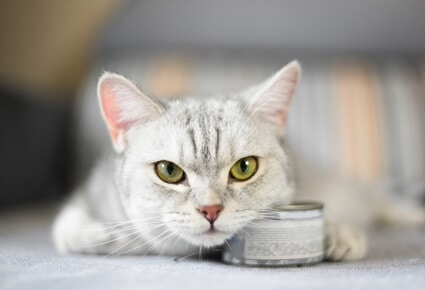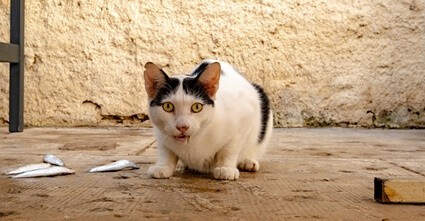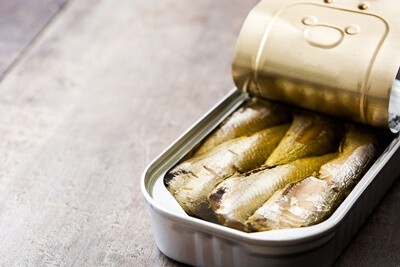Despite not hunting in water or fishing in the wild, cats like eating sardines. Given that some human foods are toxic to cats, this makes owners wonder if it’s safe to feed cats sardines.
Sardines are healthy for cats because they’re high in protein, which cats break down into amino acids for energy. They also contain minerals like calcium, copper, iron, phosphorus, selenium, and zinc, which cats require for a healthy coat and internal organs. Sardines also assist with hydration due to their high water content.
Cats like fish due to their high protein content. However, you should only feed your cat sardines infrequently, and you must drain the can of any added oils, sauces, or brine. Sardines in spring water are preferred.
Can Cats Eat Sardines?
Cats enjoy sardines, just as they do all types of oily fish.
Oddly, cats don’t hunt in water, and they don’t eat fish in the wild. So, it’s unclear where they developed their taste for eating fish.
A cat’s diet should be high in protein, which is why cats almost solely eat meat. Fish has about the same amount of protein as white and red meats.
Sardines are rich in protein, vitamins, and minerals. However, canned sardines may have bones in them, but these are small and bendy, so your cat can digest them without any problems.
Another issue is whether the oils, brines, and sauces that sardines are covered in are unhealthy. Each kind of sauce or oil should be OK, as long as too much isn’t consumed.
Drain the sardines first so that you minimize how much of the sauce or oil you feed your cat. Preferably, feed your cat sardines in spring water with no added salt to avoid giving your cat excessive sodium or fat.
Oil
Sunflower oil isn’t bad for cats in small quantities.
So, if you feed a cat one sardine with the sunflower oil mostly drained from it, that’s not a problem. Neither sunflower oil nor olive oil is toxic to cats.
However, large quantities of sunflower oil (or any oil) can cause diarrhea. It will also fatten your cat up over time, so don’t feed it too much.
The same applies to sardines in olive oil, which is slightly better but still shouldn’t be consumed in large quantities.
Brine
Brine is a term for saltwater. Foods are stored in brine because it preserves foods, which is an ancient practice.
Unfortunately, salt is bad for cats because it can lead to high blood pressure (hypertension). So, avoid feeding your cat too much brine.
One sardine in brine isn’t a problem for an otherwise healthy cat, but first, you should wash it off.

Tomato Sauce
Tomato is a fruit, and cats don’t eat fruit because it doesn’t contain the nutrition that cats need.
You can feed sardines in tomato sauce to your cat, and it’ll eat them because it likes sardines. However, it would probably prefer to have the sardines without sauce.
Spring Water
The best option is sardines in spring water because it doesn’t have any added sodium or fat.
Sardine Nutritional Information
Sardines are nutritious for cats, containing minerals in high quantities and vitamins in lower quantities.
On a macro level, sardines are high in protein and contain some fat, with no carbohydrates.
Here’s a table using data from NutritionValue.org detailing the macronutrients that sardines contain.
This table relates to sardines stored in sunflower oil:
| Macronutrient | Amount per 100g |
|---|---|
| Protein | 25g |
| Fat | 11g |
| Carbohydrate | 0g |
| Fiber | 0g |
| Water | 59.6g |
| Calories | 208 |
Cats need protein because they’re obligate carnivores.
Cats that eat lots of dry foods struggle to get enough water from their diet, while sardines contain plenty of water.
Sardines are rich in vitamins and minerals:
| Vitamin/Mineral | Amount per 100g |
|---|---|
| Niacin (Vitamin B3) | 5.245mg |
| Pantothenic Acid (Vitamin B5) | 0.642mg |
| Riboflavin (Vitamin B2) | 0.227mg |
| Vitamin B12 | 8.94ug |
| Vitamin B6 | 0.167mg |
| Vitamin E | 2.04mg |
| Calcium | 382mg |
| Copper | 0.186mg |
| Iron | 2.92mg |
| Magnesium | 39mg |
| Phosphorus | 490mg |
| Selenium | 52.7ug |
| Sodium | 307mg |
| Zinc | 1.31mg |
Cats need calcium, copper, iron, magnesium, phosphorus, and selenium.
However, according to JSAP, cats fed largely fish-based diets can be deficient in vitamin K.
Are Sardines Good for Cats?
Sardines contain protein, which cats need in higher relative quantities than other animals. Rather than using carbs for energy, cats mostly use protein. Also, amino acids are required to build healthy muscle mass.
According to Cambridge University Press, the fish oils in sardines may reduce the effects of brain aging in older cats.
Sardines are better for cats than standard dried treats because dried treats can cause or exacerbate kidney disease. Cats hardly drink, getting most of their water from food.
What Are the Side Effects of Sardines in Cats?
While sardines are healthy for cats, they aren’t an optimal food source.
They can cause several side effects when fed in large quantities, including:
Diarrhea
Diarrhea can occur when a cat eats something that’s too oily. While one sardine wouldn’t be too oily for a human’s digestive system, cats are significantly smaller animals.
A comparatively small amount of oil could have a laxative effect on a cat.

Choking Hazard
Canned sardines may contain bones, but these won’t be too large for a cat to handle unless your cat is particularly small. Even then, your cat will chew through the sardine and eat around any bones that are too big.
Mercury Poisoning
According to the Journal of Toxicology and Environmental Health, cats that eat tuna can have elevated mercury levels.
Mercury poisoning affects the internal organs of cats, and it can harm the development of kittens if ingested by pregnant cats. Of course, your cat won’t ingest enough mercury from eating just 1 or 2 sardines.
How To Make Sardines for Cats
Open the can, drain it, wash off any brine/oils, and place the sardines in your cat’s food bowl.
Feed it as part of your cat’s meal or offer them 1 or 2 sardines separately as an occasional treat.
How Often Can Cats Eat Sardines?
Limit consumption to 1-2 sardines per week. You can feed your cat sardines more frequently than this, as long as you adjust your cat’s regular diet so that it’s not getting too many calories.

